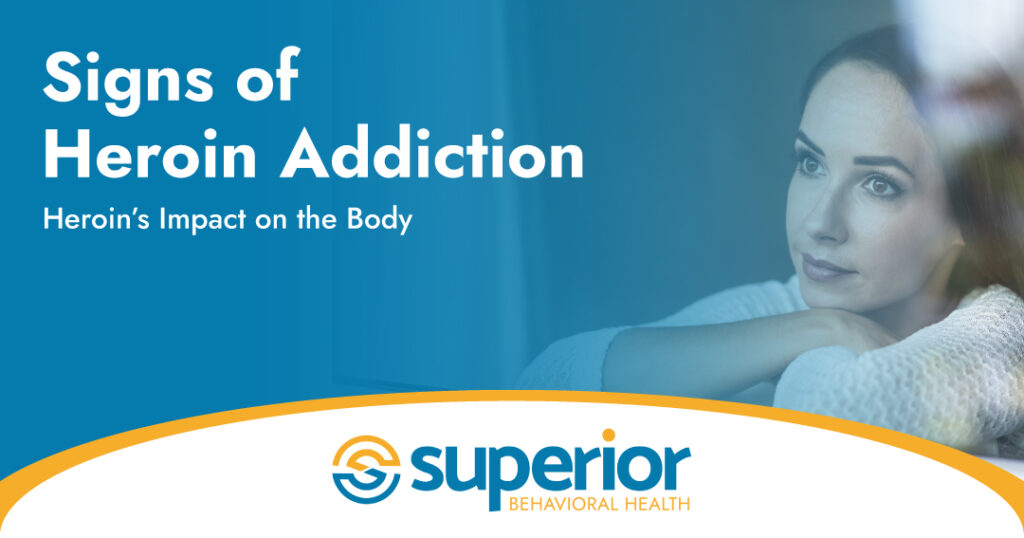No one ever intends to get addicted to heroin. Most of the time, that first dose of heroin comes out of curiosity, or the desire to escape from some sort of pain, whether it be physical or emotional. The “high” that comes with heroin is hard to resist once you experience it. Some people even write songs about their substance use and the way it beckons them back time after time until their life feels completely out of their control.
Does that sound familiar? Around 3,750 people in Cuyahoga County reported using heroin/fentanyl in the second half of 2021, so if you can relate to that story, you aren’t alone. Superior Behavioral Health is very familiar with stories just like these, and the people that tell them.
Are you wondering if someone you love has a heroin use disorder? Maybe you’re trying to determine if you have a heroin use disorder yourself. Read on to learn more about the signs of heroin addiction.
Heroin’s Impact On The Body: Physical Symptoms Of Heroin Addiction
The most obvious way to tell someone has a heroin use disorder is through physical signs. Physical symptoms of heroin use disorder include the following:
- Weight loss
- Persistent flu-like symptoms
- Needle marks, bruises, and/or scabs on the skin
- Nausea and vomiting
- Lowered heart rate
- Fatigue and lethargy
Aside from symptoms a person with a heroin use disorder may feel themselves, there are also behavioral signs of heroin use disorders others can observe, such as:
- Wearing long sleeves and pants even in warm weather (to hide track marks)
- Lack of interest in hobbies and former friend groups
- Absences from work and/or school
- Lowered performance at work and/or school
- Frequently borrowing or stealing money
- Lying about whereabouts

Heroin’s Impact On The Mind: Psychological Signs Of Heroin Addiction
Heroin use disorder also impacts the mind. Psychological and cognitive signs of heroin use disorder include:
- Mood swings
- Confusion
- Anxiety
- Depression
- Irritability
- Hallucinations
- Paranoia
- Poor judgment
- Shame and hopelessness
The Dangers And Health Consequences Of Heroin Addiction
With frequent heroin use comes an increased risk of heroin overdose, especially because heroin is often mixed with other more dangerous substances, such as fentanyl. This is the most dangerous potential result of a heroin use disorder, because without medical attention, a person overdosing will die.
There are also other ways heroin use disorders impact a person’s health long-term. Such complications include clogged blood vessels due to additives in heroin, pneumonia, organ damage, HIV/AIDS from sharing needles, seizures, stroke, heart attack, and worsening mental health conditions.
What Type Of Person Gets Addicted To Heroin? Risk Factors Of Heroin Addiction
Ultimately, anyone can get addicted to heroin. It does not discriminate. Some research suggests a small genetic component when it comes to who develops heroin use disorder, but what leads to heroin use is most often environmental.
People with pre-existing mental health conditions and trauma are more likely to use substances than those without them. Heroin may seem like an escape from pain for people in desperate positions, and the high it provides can lead to continued use and development of heroin use disorder. People with friends and/or family who use heroin are also more likely to develop a heroin use disorder, both due to potential peer pressure and frequent exposure making heroin use seem more acceptable. Men are slightly more likely than women to develop heroin use disorder, and heroin use frequently starts in a person’s early twenties.
Does My Teen Have A Heroin Use Disorder? Recognizing Heroin Use In Teenagers
While the most common demographic for heroin use is young adults, teens are not immune from heroin use disorders, and it’s an understandable concern for parents. The signs of heroin use disorder are the same in teens as they are in adults, though school performance and friend groups are more relevant to monitor in teenagers. Due to their already turbulent nature, their behavioral and psychological symptoms may be more intense than those in adults.
Drug Paraphernalia And How It Relates To Heroin Use
Everyone with a heroin use disorder uses drug paraphernalia to some degree. Heroin must be injected, snorted, or smoked, and some people may leave evidence of their use behind. Be on the lookout for out-of-place syringes and needles, remnants of white powder in plastic bags, burned silver spoons, and gum and/or foil wrappers with burn marks.

What Should I Do If Someone I Know Is Addicted To Heroin?
If you recognize the signs from this article in someone you know, the best thing you can do is encourage them to attend heroin rehab. Bringing up their heroin use won’t be easy, and they may react with hostility, but be patient, stay calm, and let them know you’re there and want to help them. You can’t force someone with heroin use disorder to seek treatment, but you can express your concern and love for them, encourage them, and provide them with information about their treatment options.
If you’re in the Cleveland, Ohio area and need heroin use disorder treatment, Superior Behavioral Health is here to help you. We are a friendly, local community ready and willing to welcome you with open arms. We offer same-day appointments, so if you’re ready to conquer your heroin use disorder, call us at 216-435-1110 today to start your journey to recovery.


